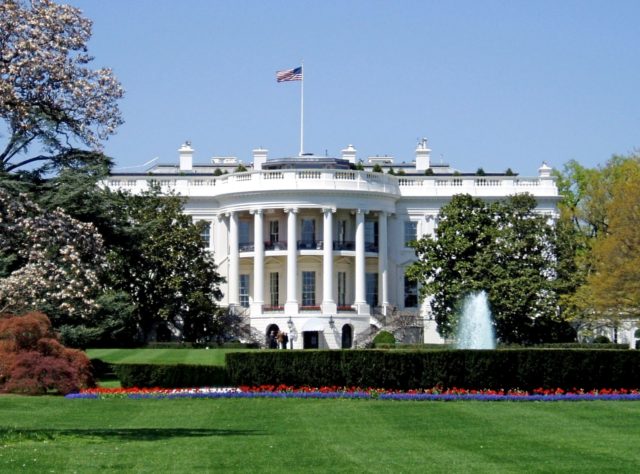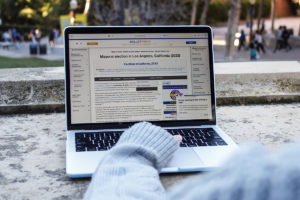UCLA community members discussed the future of artificial intelligence following federal and state government actions last year to regulate the use of the technology.
In a federal executive order issued Oct. 30 outlining new standards for AI security in the United States, President Joe Biden issued guidance for setting stricter security standards and protecting privacy. The directive specifically calls for legislation that protects kids from risks posed by AI, addresses discrimination in the technology and ensures responsible government use of AI.
The order follows federal legislation proposed earlier. Rep. Ted Lieu – who represents California’s 36th congressional district, which encompasses Westwood and UCLA – introduced the National AI Commission and the Block Nuclear Launch by Autonomous Artificial Intelligence Acts. If passed by Congress, the former bill would create a bipartisan House of Representatives commission to review AI regulation and advise Congress, while the latter legislation aims to ensure that AI is never used to make nuclear launch decisions unless humans oversee the process, Lieu said in an emailed statement.
Lieu said in the statement that Biden’s executive order helps to curb some worries he has about the potential misuse of AI.
“The Executive Order addresses several areas of concern related to AI that have emerged as the technology develops, including AI-enabled fraud and deliberate deception as well as potential use of AI to engineer dangerous biological materials and other weapons,” he said in the statement.
Lieu added in the emailed statement that the order also calls for incorporating the National Institute of Standards and Technology’s AI Risk-Management Framework into guidelines for federal agencies, which would “incorporate trustworthiness considerations into the design, development, use, and evaluation of AI products, services, and systems,” according to the framework’s handbook.
He also said in the statement that he believes Gov. Gavin Newsom’s September state executive order on preparing California for AI development sets expectations for responsible use of AI in the state as well.
“AI will impact California’s workforce and economy in ways we cannot even predict today, and this Order calls attention to the need for deliberate and responsible deployment of AI,” Lieu said in the emailed statement.
Lieu said in the statement that continuing to explore AI is an important responsibility of the state and UCLA, noting that UCLA was awarded $250,000 from the National Science Foundation early last year for cognitive science and AI research.
As AI continues to be developed, some UCLA community members said they have encountered this technology in a variety of academic settings.
Maria Cha, a continuing lecturer in the Department of Statistics and Data Science, said AI has been in existence for a long time, and people have been using it without knowing.
Cha said she feels that the technology has now become a humanized computer system, such that it sometimes feels as if she is actually talking to another person when using it.
Cha said she recently saw students using platforms such as ChatGPT and that her department has had conversations about the way open-source AI can influence the classroom. She added that it is a department joke that if midterm scores are lower, it must be because students are using ChatGPT.
“Even though they can do things on their own, they trust AI more,” she said.
However, Cha said she thinks it may still be too early to adopt the use of AI in a classroom because of the developing nature of the technology.
Despite this, some students are still using AI on their own for academic help. Ashita Singh, a second-year computer science student, said she uses AI technology to better understand academic concepts, personalized tutoring and educational resources. She added that AI can also result in disparities in access to these technologies.
She said with any new technology such as AI, there will be certain problems that arise.
“It’s (Biden’s executive order is) definitely a step in the right direction because we do need to regulate privacy breaches and other attacks,” Singh said.
She added that she thinks the regulations could also lead AI developers like herself to be held more accountable about what they are developing.
Lieu said he is looking forward to working further to address AI security with Congress and the Biden administration to help Americans at home and abroad.
Cha added that she thinks now is the right time to implement legislation that can protect individuals’ data from phishing or scams that might utilize AI as well as from algorithms that might promote a specific path or ideology.
For example, the social media algorithms used by Instagram and YouTube or chatbots on online retailers such as Amazon all rely on AI, she said.
“If there is no regulation, then depending on the social media that we use, that will make us to think in a certain direction … because we are totally open to whatever they feed us,” Cha said.
Additionally, users tend to accept the answers AI gives them without cross-checking information, which can lead to more errors than if they had answered the question or solved the problem themselves, she said.
As the parent of K-12 students, Cha said she worries about how much they will be exposed to algorithm-generated content. However, she said her biggest concern with the technology is that people will begin to think less because of the instant gratification that AI can provide.
“We talk about the word resilience,” Cha said. “I think that’s the biggest downside of all the technology, including AI, is that we’re losing that kind of quality as a human, and that’s something that AI cannot really replace for us.”






Comments are closed.